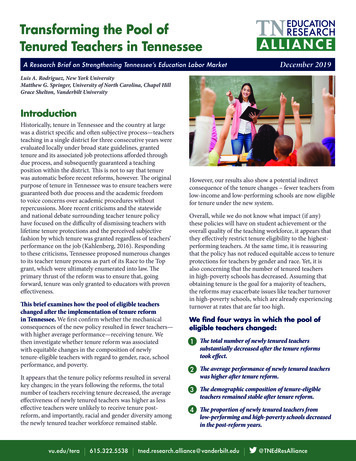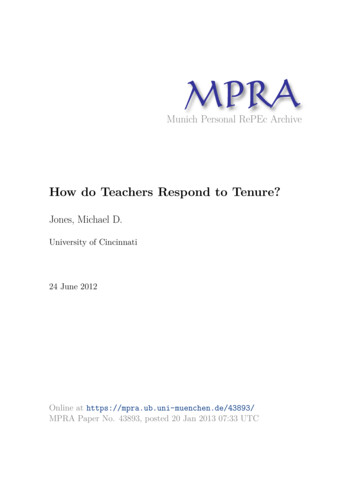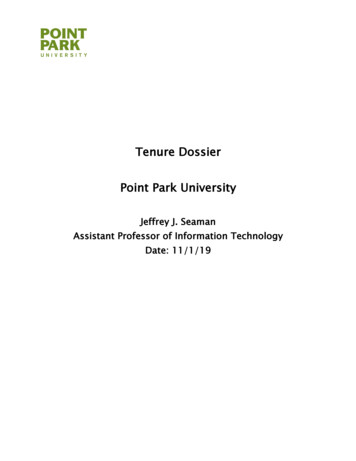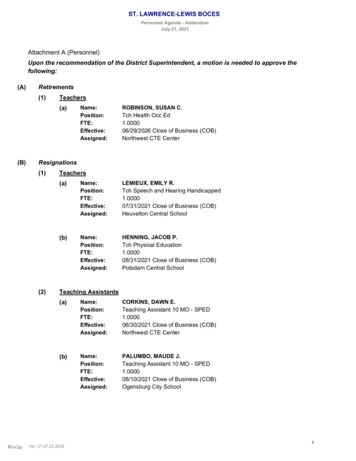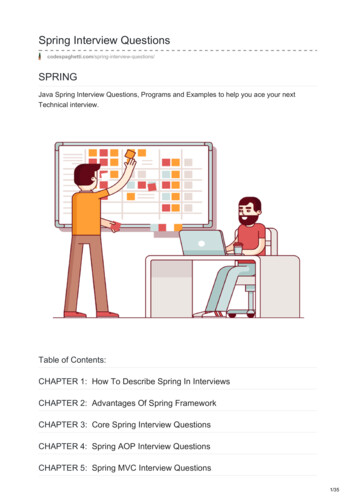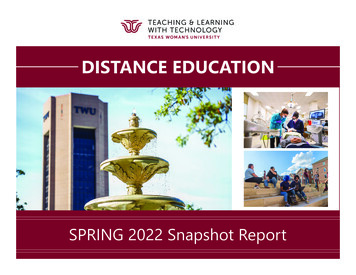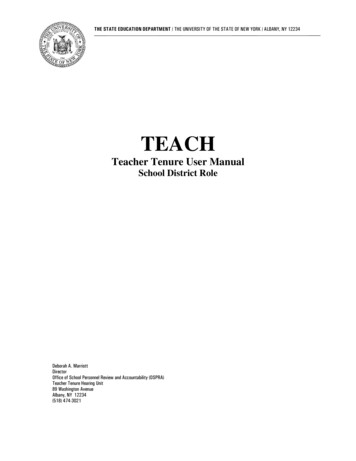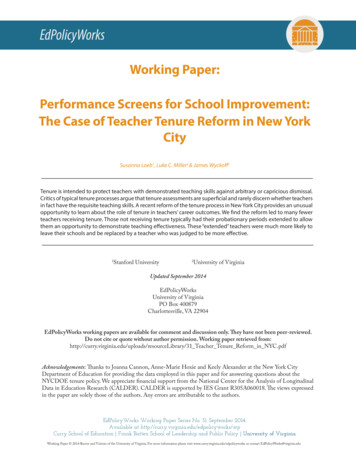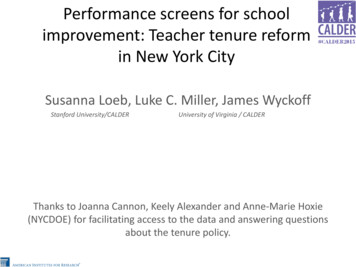
Transcription
Spring 2017: Overview – TenureARTICLE VI: INSTRUCTIONAL STAFF SECTION 6.2. PERMANENTINSTRUCTIONAL STAFF –TENURE [http://policy.cuny.edu/bylaws/article vi/section 6.2./text/]A person employed on or after September 1, 2006 full-time on an annual salary in the title ofprofessor, associate professor, assistant professor, medical professor (basic sciences), associatemedical professor (basic sciences), assistant medical professor (basic sciences), medicalprofessor (clinical), associate medical professor (clinical), assistant medical professor (clinical),law school professor, law school associate professor, law school assistant professor, law schoollibrary professor, law school library associate professor, law school library assistant professor orin any grade or position which the board in its discretion may add hereto, who after serving on anannual salary in any of the above titles for seven full years continuously, has been appointed orshall be appointed for an eighth full year, shall have tenure effective on the first day of Septemberfollowing his/her reappointment for the eighth full year.EXCERPTS FROM THE FACULTY PERSONNEL PROCESS GUIDELINES,Effective March 2017These passages are excerpted from the main document for your general guidance.Please consult the complete guidelines in preparing for your action(s).I. THE CANDIDATE’S FILE AND THE FORM CI.A.2. A candidate for tenure, certification or promotion must also provide a CV (not required ofcandidates for reappointment).I.B.2. For candidates for reappointment or tenure, the Form C shall first list thosecontributions since the initial John Jay appointment. Candidates for reappointment or tenureand/or promotion to Associate Professor shall list works released before their tenure trackemployment at John Jay, but these must be listed separately in a section following works whichwere released while at John Jay. Candidates for promotion to full Professor shall clearly identifyand first list materials released since attaining their current rank. Materials released prior totheir last promotion (or appointment to current rank) shall be listed separately.I.C. Outside Letters of EvaluationI.C.1. GeneralI.C.1.a. A minimum of four and a maximum of six outside evaluations must be obtained forcandidates for tenure and for promotion. The Provost will solicit these letters.I.C.1.b. Before April 15, the chair of the candidate's department will contact the four to sixpotential evaluators to determine if they are willing to write a letter of evaluation. By April 15,the chair will forward the names of all who respond positively to Provost’s Office. The Provost’sOffice will send the candidate's packet to each evaluator. The evaluators will be requested toprovide their evaluation letters by July 1. When a candidate is coming up for two actions, e.g.,tenure and promotion, the evaluators will be asked to comment on both actions in the sameletter.Overview: Tenure [3.2017]Page 1 of 8
Spring 2017: Overview – TenureI.C.1.c. The purpose of the outside letters of evaluation is to establish the reputation of thecandidate beyond the college community with regard to the relevant criteria by which thecandidacy will be evaluated. The letters should speak to these academic qualities specifically,and it is therefore suggested that they be solicited from academic persons. Candidates shouldkeep this purpose in mind when proposing persons to write the letters.I.C.1.d. An evaluator who has direct knowledge of the candidate's teaching, professionalactivities, etc., may also speak to that. In addition, the letters should specify the nature of therelationship of the evaluator to the candidate.I.C.2. Selection of Outside EvaluatorsI.C.2. a. The candidate and the candidate’s chair shall confer about the names of potentialevaluators. If the candidate has an objection to any individual proposed as an evaluator by thechair, the candidate shall submit that objection in writing to the chair. The chair shall forwardthe names of four to six individuals, who have agreed to act as potential evaluators, to theProvost. If the chair decides to forward the name(s) of any individual(s) to whom the candidateobjected in writing, the letter of objection shall be attached to the evaluator’s letter in thecandidate’s file.I.C.2.b. If the candidate is a department chair, then the Provost, in consultation with thedepartment Personnel and Budget Committee (hereafter, P&B), will supply the list of nameswhich would otherwise have been submitted by the chair.I.C.2.c. Candidates and chairs should not propose members of the John Jay College faculty aspotential evaluators. In addition, names of evaluators should not include relatives. Only inexceptional circumstances should co-authors of the candidate serve as outside evaluators. It isthe responsibility of the candidate to explain such exceptional circumstances in the selfevaluation. The evaluation letters are not to be letters of personal recommendation, butassessments of the scholarly quality and quantity of the candidate’s work as it bears on theaction for which the candidate is being considered. Candidates should know that letters ofevaluation written by former professors of the candidate are usually given less weight thanletters of evaluation from others.I.C.2.d. Evaluators from within CUNY: Tenure: Some letters must be from evaluators who are outside the CUNY system,although it is permissible for some to be from within CUNY. Promotion to Associate Professor: It is strongly suggested that the majority of evaluatorsbe from outside CUNY, as the burden is on the candidate to show that his or her qualitiesare "respected outside his/her immediate academic community.” Promotion to Full Professor: The burden is on the candidate to demonstrate "anestablished reputation for excellence in teaching and scholarship in his/her discipline."Therefore it is suggested that no more than one letter be from within CUNY.I.C.2.e. The candidate and the chair should be notified immediately if either the proposedevaluator declines to write an evaluation or the letter of evaluation has not reached the Provostby August 1. In either case, a substitute evaluator will be solicited by the Provost from the chairin consultation with the candidate.Overview: Tenure [3.2017]Page 2 of 8
Spring 2017: Overview – TenureI.C.2.f. Material sent for evaluation is material produced since the last personnel action, or inthe prior seven years, whichever is longer. The selection of the material to be sent to theevaluators shall be made by the candidate subject to final approval by the Provost. The packageshall include a list of the material sent. A copy of the list shall be in the candidate's file.II. THE PERSONNEL PROCESSII.A.9. Every candidate is reviewed and voted upon for every year until tenure is decided. Afaculty member comes up for tenure review during the seventh year of service. The followingtable summarizes the schedule of consideration. In the table, the following terms are used: Service year: The year during which the action is considered. For example, during thesecond year of service a candidate is considered for reappointment to the third year. Appointment year: The year to which the action pertains. For example, during thesecond year a candidate is considered for reappointment to the third appointment year.Sample Timetable for a Candidate Initially Appointed in Spring or Fall 2015Year ofServiceAction DateColloquial Name for ActionsInitial Appt.Spring 15/Fall 15Initial Appointment11st YearSpring 161st Reappointment22nd YearFall 162nd Reappointment33rd YearFall 173rd Reappointment.44th YearFall 184th Reappointment55th YearFall 195th Reappointment66th YearFall 206th Reappointment77th YearFall 21Overview: Tenure [3.2017]7th Reappointment w/Tenure,effective Fall 15AppointmentYear8/TPage 3 of 8
Spring 2017: Overview – TenureIII. GUIDANCE FOR CANDIDATES AND PERSONNEL COMMITTEESIII.A. General Guidance for CandidatesThe criteria used in making personnel recommendations and decisions are governed by theBylaws and policies of the Board of Trustees of the City University of New York, including theStatement on Academic Personnel Practice of the City University of New York and the MaxKahn Memorandum. Nothing in these guidelines should be interpreted as contradicting CUNYBylaws, policies, and procedures. The purpose of this section is to provide guidance to thefaculty - both those on personnel committees and those considering or coming up for personnelactions - on the factors they should take into account in demonstrating and assessing whetherthe criteria have been met.Demonstrating professional and collegial behavior is a material factor in the assessment of acandidate's case. The CUNY Code of Practice Regarding Instructional Staff Titles (Section 1.2)states: ".the candidate must have demonstrated satisfactory qualities of personality andcharacter, ability to teach successfully, interest in productive scholarship or creativeachievement and willingness to cooperate with others for the good of the institution." .In considering individual cases extraordinary performance in one or more areas can sometimescompensate for lesser or perceived lesser contributions in another area.III.B. TeachingIII.B.1. Reappointment, tenure, and promotion depend upon the candidate having achievedclearly discernible effectiveness as a teacher. The two external criteria most frequently used inevaluating teaching effectiveness are student evaluations (written comments as well asnumerical evaluations) and departmental peer observations. In addition, the candidate maypresent evidence of professional recognition for teaching in the form of awards and otherprofessional honors. The candidate is also expected to demonstrate teaching effectiveness in theform C by providing evidence of achievement across a range of teaching-related activities.III.B.2. Evidence that may be presented in making the case for the candidate’s effectiveness asa teacher includes but is not limited to those activities listed below.Evidence of Originality and Creativity in Teaching Practice: Development of new and well-received courses and innovative pedagogy (relevant syllabishould be included in the file);Development of effective techniques for teaching and academic support;Use of outcomes assessment strategies to measure student learning and enhanceteaching;Effective use and incorporation of technology when appropriate.Evidence of Mentoring: Sponsoring of students for awards, scholarships, student competitions; inclusion ofstudents’ writings in John Jay's Finest and other publications;Mentoring McNair or other undergraduate research scholars;Overview: Tenure [3.2017]Page 4 of 8
Spring 2017: Overview – Tenure Supervising senior theses, advising CUNY BA students, and directing independentstudies;Seeking grants to promote research opportunities for students and to address students’academic needs (grant application/narrative must be in the file);Advising students (beyond major advisors who get released time for this activity);Mentoring and supervision of adjuncts and Graduate Teaching Fellows;Mentoring undergraduate and graduate students (including both master’s and doctoralstudents) in scholarly and professional activities.Evidence of Professional Development: Organizing and/or attending and participating in faculty development programs;Participating in the programs offered by the Center for the Advancement of Teachingand integrating the best practices learned into the courses taught; andParticipation in and presentation at conferences on teaching and learningEvidence of Teaching Breadth: Variety of courses taught;Engagement of students at differing levels of ability and preparation;Variety of teaching formats (e.g. hybrid, large lecture sections, small capstone seminar)III.B.3. For faculty members in the Library Department, “teaching” is to be interpreted as“librarianship” to reflect the overall goals of the library including developing, organizing,preserving, maintaining, making accessible, and interpreting informational resources forteaching, learning, and research. This section addresses information literacy, collectiondevelopment, reference and instruction, user services, information technology and application,library administration and management, special collections, and print and digital archives.III.B.4. Department chairs are encouraged to incorporate discussion of the above factorswhen applicable into annual evaluations that can then be included in the candidate’s personnelfile. Candidates are urged to discuss their teaching philosophy and effectiveness in the Form Cself-evaluation narrative.III.B.5. Factors which might negatively affect a personnel action and suggest that a candidateneeds to pay more attention to his/her teaching are: below average student numerical evaluations for the discipline and course involved, orconsistently negative written comments;peer observations indicating less than effective competence/interest in teaching;inattention to persistent problems in teaching;lack of co-operation in meeting departmental scheduling needs;being unavailable to students during posted office hours;a record of coming late to class, leaving early, giving finals early etc. as this is registeredin writing to the chair, dean, or Provost; andlate submission of grades or inattention to incomplete grades.III.C. Research and ScholarshipIII.C.1. General CriteriaIII.C.1.a. Research/publication is expected to be related to the candidate's field and make acontribution to scholarship. In the creative and educational fields, as per the CUNY Bylaws,Overview: Tenure [3.2017]Page 5 of 8
Spring 2017: Overview – Tenureforms of excellence other than scholarly print publication are recognized. For non-print works,documentation in the form of audio or video recordings, visual presentations, web-publications,etc., shall be provided in appropriate format to the Provost's Office. The Provost's Office willmake these accessible to the members of the FPC by providing the necessary equipment. Theseworks will be judged by the same criteria listed below for scholarship.III.C.1.b. Publications submitted in support of an application are to be in published form (withthe exceptions for creative artists noted above) or in galleys or page proofs. Works not at thatstage should not be listed as publications, but as Works in Progress. (For a journal article, ifgalleys are not available an acceptance letter from the editor of the journal would be acceptable.)In the Works in Progress section, candidates are encouraged to give as much specificinformation as possible as to the work’s status (for example, “under contract with manuscriptdelivery date of August 20xx” for a book, or “forthcoming in spring 20xx issue” or “invited torevise and resubmit” for a journal article). Please see Section III.D. for a Glossary for ReportingStatus of Publications and Works in Progress.III.C.1.c. It is recognized that different disciplines have different criteria by which to assessexcellence, such as the role of multiple authorship and the length of articles, or the value andnature of the candidate's artistic or journalistic works. It is the responsibility of the candidate’schair, in developing the annual evaluation, to assess how the candidate’s scholarship satisfiescriteria of the candidate’s department and discipline and how it demonstrates progress towardmeeting the requirements for tenure relative to their time of service at the college. Thecandidate must also address these matters in the Form C.III.C.2. Standards for Scholarship: TenureFor tenure, peer reviewed scholarship in the form of articles, creative works appropriate to thediscipline, a book or their equivalent is generally the best way to demonstrate scholarlyachievement. Faculty approaching a tenure decision should recognize that evidence of scholarlyproduction is important and that materials that have not been accepted for publication will begiven little or no weight. The publication of a doctoral dissertation, in itself, as a book or as aseries of refereed articles without significant expansion and/or development will generally notbe sufficient for tenure. Rather, it should be demonstrated to be a part of an ongoing program ofresearch and scholarship.III.D. Glossary for Reporting Status of Publications and Works in ProgressThe candidate is responsible for describing the status of publications and work in progress asexplained in Section III.c.1.b. The following categories will be useful in characterizing thevarious stages of a work. Published: Indicate venue/press, date, page numbersIn Press: Currently being physically or digitally produced for publicationForthcoming: This category is reserved for work that does not require any contentrevision by the author and does not require any further evaluation. It describes a statebefore the work is in press and includes fully accepted, fully complete works right beforethey go to press and works for which the author is reviewing proofs or preparing anindex.Revise and Resubmit: The work has been evaluated and not yet accepted; the authorhas been asked to revise it and resubmit it to the journal or publisher that recommendedOverview: Tenure [3.2017]Page 6 of 8
Spring 2017: Overview – Tenure revisions. The author should indicate whether he/she is in the process of revising or hasalready revised and resubmitted. This category excludes work that has been rejected,which the author is now revising with a view to submitting elsewhere. Work beingrevised for resubmission elsewhere should be indicated as “in progress.”Submitted: The manuscript has been sent to a journal/publisher; the author isawaiting response.Under Contract: The author has a signed contract from a press with a manuscriptdelivery date.Proposed: A book project in very early stage, manuscript not yet drafted, but publisheris evaluating the proposal.In Progress: The project is underway, but has not yet been submitted to or evaluatedby a journal or press.III.E. ServiceIII.E. 1. Department, college, and university service is recognized as important in considering acandidate for promotion to either Associate or full Professor, as well as in reappointment andthe granting of tenure. The expectation for service increases as one moves up the ranks. Whilecandidates for tenure are expected to demonstrate a commitment to service, candidates forAssociate Professor should have an established record of service to the college community and/or university. Candidates for full Professor should have established records of continuing andincreasingly significant service to the college and to the outside community.III.E.2. It is recognized throughout the college that certain activities and committees take asignificant amount of time and energy and have a significant impact on the college community.These may include, but are not limited to: participation on the Faculty Senate and College Council (as department representative orat-large)at-large member of the FPC;participation on the College Curriculum and Academic Standards Committee (UCASC)and its subcommittees;advising of student clubs;Chairing of, and participation in, various ad hoc committees (such as Middle States)college representation on the PSC-CUNY Research Foundation;service as chair or college administrator;leadership and participation in conferences, colloquia, and symposia held at the collegeor the university: andparticipation on the University Faculty SenateIII.E.3. Candidates should clearly document the nature of their service on the Form C, andinclude it also in the self-evaluation narrative. Any published materials resulting from suchservice, for which the candidate is responsible, may be included in the file.III.E.4. The name of the chairperson of the committees on which the candidate has servedshould be noted next to the name of the committee on the Form C. The department chair will beresponsible for contacting the chairs of those committees for comments on the candidate'scontribution. It is appropriate that this information be shared with the personnel committees ateach level of the process. Candidates are also encouraged to document their file with letters thatOverview: Tenure [3.2017]Page 7 of 8
Spring 2017: Overview – Tenuredescribe their service when extraordinary, such as letters of thanks from committee chairs orprogram managers.III.E.5. Service thus consists of not merely being a formal member of a committee, but will beevaluated in terms of level of work involved, attendance, participation, and contribution.III.E.6. A candidate may offer evidence of pertinent and significant community and publicservice in support of reappointment. Evidence of such service may include, but not be limited to: Service provided to community organizations with purposes broadly related to themission of the college and the areas of focus of the college's academic programs;Service to professional organizations related to the candidate's discipline or area ofprofessional expertise;Providing public information and education through the news media;Providing public education by appearing in public events, documentaries, and othermeans of public information;Service to the federal, state, and local government in special roles such as an advisor,expert, mediator, or compliance monitor; andService as an elected or appointed public official or as a governance board member for anindependent organization, provided that the service can be rendered in a manner thatcomplies with applicable CUNY regulations.IV.B. General Timetable for Preparation of the Record for Fulltime FacultyIV.B.1. Full-time tenure-track faculty must be reviewed and voted on for annualreappointment and for reappointment with tenure prior to December 1 during the fall of eachyear. These annual reappointments and the reappointment with tenure votes are mandatory.An unsuccessful candidate for reappointment or reappointment with tenure will completeservice for the current year of appointment, but may not return to full-time service thesubsequent year.IV.B.3. For full-time faculty members in professorial titles and for full-time lecturers andinstructors, reappointment, early tenure, tenure, appointment with a Certificate of ContinuousEmployment, and promotion are considered by a series of committees. Since the committees –beginning with department P&B – meet in early September, candidates should begin organizingand augmenting their personnel files during the previous spring. Promotion, reappointment,and tenure candidates are required to complete all updates to their personnel file in theProvost's Office by the second week of September. The procedures for obtaining outside lettersof evaluation for inclusion in the personnel file have a separate timetable. (See Section I.C of thisdocument.)Overview: Tenure [3.2017]Page 8 of 8
Spring 2017: Overview - Tenure Overview: Tenure [3.2017] Page 5 of 8 Supervising senior theses, advising CUNY BA students, and directing independent studies; Seeking grants to promote research opportunities for students and to address students' academic needs (grant application/narrative must be in the file); Advising students (beyond major advisors who get released time for this activity);
